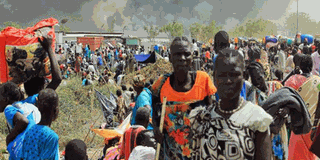AU urged to act as violence spreads in S. Sudan

South Sudanese civilians flee fighting in Malakal on February 18, 2016, where gunmen opened fire on civilians sheltering inside a United Nations base. Human Rights Watch (HRW) has urged the African Union to move forward with creation of “hybrid courts” in South Sudan, as the NGO reported that atrocities are spreading to new parts of the country. PHOTO | JUSTIN LYNCH |
What you need to know:
- Human Rights Watch (HRW) has urged the African Union to move forward with creation of “hybrid courts” in South Sudan, as the NGO reported that atrocities are spreading to new parts of the country.
- Rebel groups in the region, collectively known as the Arrow Boys, are also responsible for attacks on civilians, including the December rape of a 67-year-old Catholic nun, the group added.
- The group said the United Nations should impose an arms embargo on all forces involved in South Sudan’s conflicts.
- HRW also called on the African Union to make good on its commitment to establish special courts to try the most serious crimes linked to the civil war.
- The violence in Western Equatoria is at least partly tribal in nature, HRW said in a report on investigations conducted by its researchers last month.
NEW YORK, Thursday
Human Rights Watch (HRW) has urged the African Union to move forward with creation of “hybrid courts” in South Sudan, as the NGO reported that atrocities are spreading to new parts of the country.
Government forces have recently carried out numerous killings, rapes and other grave rights abuses in South Sudan’s Western Equatoria region, HRW said.
Rebel groups in the region, collectively known as the Arrow Boys, are also responsible for attacks on civilians, including the December rape of a 67-year-old Catholic nun, the group added.
Outbreaks of organised violence did not begin occurring in Western Equatoria until May 2015 - 18 months after the start of the South Sudan’s civil war, HRW noted.
“As South Sudan’s fighting has shifted west, so too have the atrocities by government forces and rebel groups,” said Daniel Bekele, Africa director at Human Rights Watch.
The group said the United Nations should impose an arms embargo on all forces involved in South Sudan’s conflicts.
HRW also called on the African Union to make good on its commitment to establish special courts to try the most serious crimes linked to the civil war.
“The AU Commission has yet to make significant progress on creating such a court, which will need a statute, infrastructure agreements, and a budget before it can begin functioning,” the rights group said.
TRIBAL VIOLENCE
The August peace agreement signed by the main antagonists in South Sudan stipulates that the AU will set up such courts that include both international and domestic judges.
The violence in Western Equatoria is at least partly tribal in nature, HRW said in a report on investigations conducted by its researchers last month.
Government troops, comprised mainly of Dinka soldiers, have been waging a counter-insurgency against the Arrow Boys, who are mainly members of the Zande, Jur and Moru ethnic groups, the report stated.
Fighting broke out in Western Equatoria May 2015 between Dinka cattle herders and farming communities made up of other ethnic groups, HRW said.
Meanwhile, a South Sudanese journalist who went missing after release from detention was found dumped near a cemetery.
Mr Joseph Afendy, suspected to have been kidnapped on March 4 by government agents, was found on the roadside near Hai Malakal cemetery on the east of Juba on Monday night.
His father, Mr Joseph Deng, said the journalist had been tortured before being dumped.
Mr Afendy works for the Al-Tabeer Arabic daily newspaper and is believed to have written an article criticising the ruling Sudanese People’s Liberation Movement (SPLM) on the current situation in the country.




